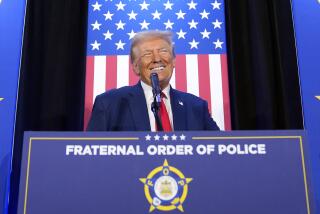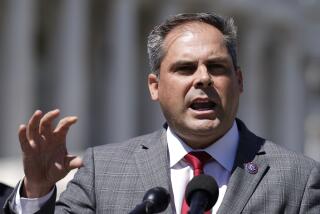Dornan, Liberals Back ‘Police Corps’ Bill
- Share via
WASHINGTON — Support for a plan to create a national “police corps” that would pay for the college education of 25,000 new officers each year was expressed by an ideologically disparate group of lawmakers at a press conference Wednesday.
“This is certainly not an ideological issue, this is a survival issue,” said Rep. Robert K. Dornan, a conservative Republican from Garden Grove, who is a co-sponsor of police corps legislation introduced in the House last month.
In an unusual display of bipartisanship, Dornan appeared at a Capitol press conference, held to announce the Senate version of the bill, with two liberal Democrats from Massachusetts--Reps. Joseph Kennedy and Barney Frank--who also are sponsors of the measure.
Led Rights Protests
Another sponsor, Rep. John Lewis (D-Ga.), is a former chairman of the Student Non-Violent Coordinating Committee, which led black civil rights protests in the 1960s.
“The criminals have gotten more sophisticated; the criminal law has gotten more sophisticated,” said Frank, who is at loggerheads with Dornan on most issues. “It’s part of our job to see that the level of sophistication among the good guys keeps up with that.”
Lewis, who headed SNCC from 1963 to 1966, said in a statement: “This is a bill that is vital to black Americans . . . . The police corps represents a commitment to check and reverse the tide of insensate violence that has crippled so many black communities.”
The bill is supported by several major police organizations, including the Fraternal Order of Police, the International Brotherhood of Police Officers and the Federal Law Enforcement Officers Assn., the lawmakers said.
The police corps, modeled after the military’s Reserve Officer Training Corps, would pay up to $10,000 a year in college expenses for applicants who serve as police officers for four years after being graduated.
The payments would be made only after the candidates had completed their police service. In the interim, educational expenses would be financed by student loans or paid directly by students.
The program would recruit a maximum of 25,000 new officers a year, and the average annual assistance probably would total about $5,000, one congressional aide said. The maximum payment for a four-year period would be $40,000.
The bill would create an Office of the Police Corps within the Department of Justice, with a director appointed by the President and approved by the Senate.
If enacted, the program’s annual estimated cost would grow from $50 million in fiscal 1990 to $490 million in 1993, said Sen. Arlen Specter (R-Pa.), one of the bill’s sponsors in the Senate. Another sponsor is Sen. Jim Sasser (D-Tenn.), chairman of the Senate Budget Committee.
Dornan, a strong supporter of President Bush in the 1988 election campaign, said that he believes the White House eventually will support the measure. A spokesman at the White House press office said that the Administration would have no comment, at least until Bush returns from Europe.
The idea behind the police corps proposal was developed in the early 1980s by a group that included Adam Walinsky, a former aide to the late Sen. Robert F. Kennedy (D-N. Y.), and former Philadelphia police officer Jonathan Rubenstein, author of a widely respected book on big city police work.
‘Bullet-Proof’ Bill
In an interview after the press conference, Walinsky said that it is no accident that lawmakers whose political perspectives vary as widely as those of Dornan and Frank support his idea.
“Democrats have shied away from crime (issues), and Republicans haven’t wanted to go near the issues of the inner city. Now these guys are ready to do it,” Walinsky said. He added: “We need that kind of broad support. We need that bracketing. We’re trying to make (the legislation) bullet-proof.”
More to Read
Sign up for Essential California
The most important California stories and recommendations in your inbox every morning.
You may occasionally receive promotional content from the Los Angeles Times.













